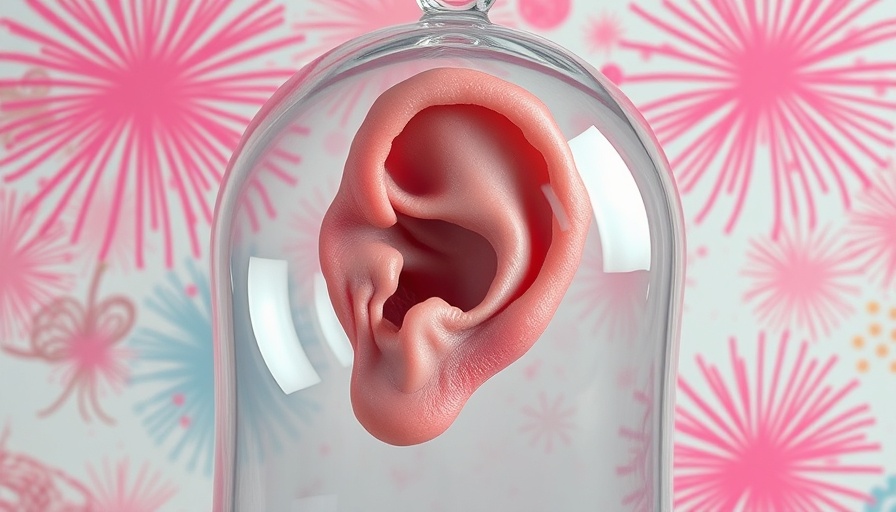
The Hidden Dangers of Everyday Sounds
For many, hearing loss creeps in unnoticed until it becomes a significant hurdle in daily life. As Dr. Howard W. Francis highlights, our youthful invincibility often blinds us to the crucial need for hearing protection. By age 75, about 55% of U.S. adults experience disabling hearing loss—a stark reminder that ignoring the danger posed by loud environments can lead to consequences far beyond simple inconvenience.
Practical Steps to Safeguard Your Hearing
Experts emphasize a proactive approach to hearing health. Here are several actionable strategies that anyone can incorporate into daily routines:
- Avoid Loud Noises: It's time to be mindful of noise levels. Regular exposure to sounds exceeding 85 decibels (dB) can cause irreversible damage over time, particularly in environments like concerts or construction sites. Consider investing in earplugs designed for concerts—these can reduce volume without distorting sound quality.
- Limit Headphone Use: As relaxing as it might be to zone out with headphones, the next time you crank up your favorite music, remember that keeping the volume under control is essential. Experts recommend using noise-cancelling headphones to enable lower volumes in noisy environments.
- Get Regular Hearing Check-Ups: Just like routine dental and physical exams, hearing assessments are essential for early detection of potential hearing loss. If you suspect any decline, seeking a professional assessment is critical.
Understanding the Science of Hearing Loss
Hearing loss is frequently linked to cumulative exposure to loud sounds, as mentioned by Dr. Dunia Abdul-Aziz. The real question is, how does sound affect our auditory system over time? Sound waves travel through the air and are converted into signals that the brain interprets, and consistent exposure to harmful levels can damage hair cells in the cochlea, leading to permanent loss. Challenges arise not just in the availability of sounds but in how individuals engage with them.
Cultural Perspectives on Hearing Loss
It’s interesting to note how different cultures approach hearing protection. For example, many Indigenous communities have long understood the importance of maintaining harmony with nature, often resulting in practices that limit exposure to loud noises. In contrast, Western cultures tend to embrace louder lifestyles and entertainment environments without considering the longer-term consequences.
Future Trends: Protecting Hearing in a Noisy World
As urbanization increases and access to technology continues to grow, the prevalence of noise pollution is likely to rise. Innovations in technology, such as AI-driven hearing aids and noise-cancelling advancements, are promising steps toward mitigating the effects of urban noise. Furthermore, raising public awareness about the importance of hearing protection could play a crucial role in shaping healthier auditory habits in future generations.
Mental Health and Hearing Loss: A Critical Link
Untreated hearing loss doesn’t just impact your ability to communicate; research links it to deteriorating mental health, increasing risks for dementia and depression. Engaging in social activities becomes challenging, leading to isolation. This cycle indicates a compelling need for preventive strategies and accessible treatment options.
Frequently Asked Questions about Hearing Protection
Understanding how to care for your hearing can often lead to more questions than answers. Here are some common inquiries:
- What decibel level is safe for listening? Generally, sounds below 70 dB are safe for your hearing. For reference, normal conversation ranges around 60 dB.
- How often should I get my hearing checked? Adults should have a hearing assessment at least once every ten years, but those over 50 or with risk factors should consider biennial check-ups.
- Are there specific technologies that can help protect hearing? Yes, products like custom molded earplugs, noise-cancelling headphones, and protected environments help shield our ears from harmful noises.
Take Charge of Your Hearing Health Today!
Recognizing the consequences of hearing loss and applying proactive steps can significantly enhance your quality of life. Each person's journey may be unique, but one common thread remains: our hearing deserves the same attention as our overall well-being. Stay informed and prioritize your auditory health—your future self will thank you.
 Add Row
Add Row  Add
Add 




Write A Comment